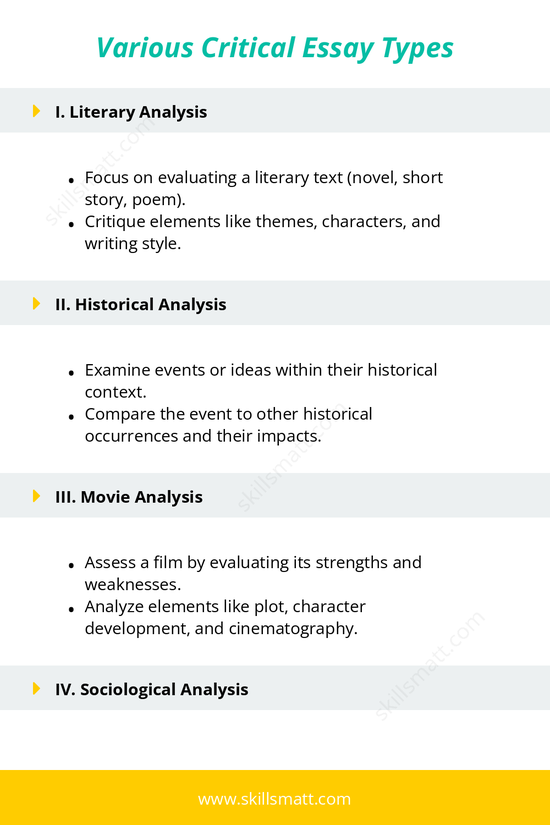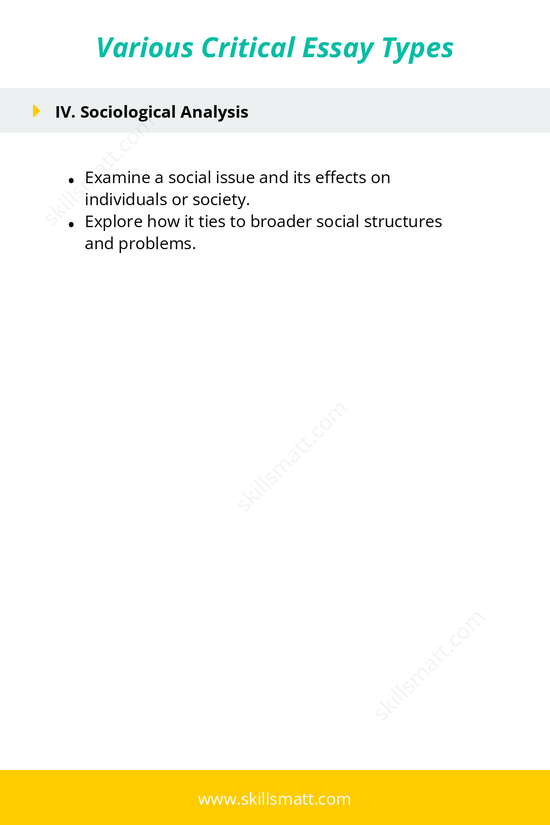Various Critical Essay Types
I. Literary Analysis
- Focus on evaluating a literary text (novel, short story, poem): Literary analysis requires a close examination of the text itself. It involves exploring elements such as plot, characters, and themes within the work.
- Critique elements like themes, characters, and writing style: In literary analysis, you would break down the main ideas or messages conveyed in the work, assess the development of characters, and consider the author’s stylistic choices that shape the text.
II. Historical Analysis
- Examine events or ideas within their historical context: Historical analysis involves looking at the events, ideas, or figures within the time period they occurred, evaluating how historical influences shaped them.
- Compare the event to other historical occurrences and their impacts: This type of analysis often involves comparison, understanding how similar events from different times or places had varying outcomes.
III. Movie Analysis
- Assess a film by evaluating its strengths and weaknesses: Movie analysis involves critically evaluating a film’s technical and narrative components, including direction, acting, and cinematography.
- Analyze elements like plot, character development, and cinematography: This includes looking at the storyline, how characters evolve, the pacing, and the visual style, and how all of these components contribute to the overall film.
IV. Sociological Analysis
- Examine a social issue and its effects on individuals or society: Sociological analysis focuses on understanding how social issues like inequality, racism, or poverty affect communities and individuals.
- Explore how it ties to broader social structures and problems: The analysis might look at how the issue is connected to broader systemic factors, such as political, economic, or cultural structures.
V. Political Analysis
- Focus on analyzing political issues in historical and contemporary contexts: Political analysis examines policies, movements, and events within political spheres, considering their impact on society over time.
- Make arguments and provide evidence to support views on the issue: Critical political essays present arguments about political issues, backing up claims with relevant evidence such as laws, statistics, or expert opinions.
VI. Narrative Analysis
- Tell the story of a text or event analytically, focusing on its themes: Narrative analysis breaks down how a story is told and how its structure, themes, and messages are conveyed to the audience.
- Explore how narrative techniques shape the message: This analysis considers how techniques like point of view, pacing, and symbolism influence the story’s delivery and meaning.
VII. Comparative Analysis
- Compare two different works (literary, film, etc.) and analyze their themes: Comparative analysis involves exploring the similarities and differences between two or more works, such as books, movies, or social issues.
- Discuss the similarities and differences in style, content, or approach: The focus is on understanding how different works approach similar themes or ideas from contrasting perspectives or with unique styles.


